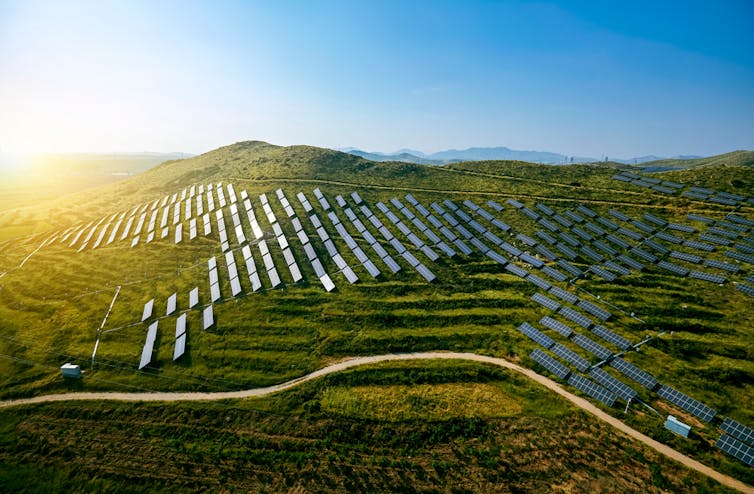Cop29 so far: the good and bad news

Gradually, then suddenly is how Ernest Hemingway described going bankrupt. The climate crisis could be on a similar trajectory.
“It took a century for the globe to warm the first 0.3°C, but the world has warmed by 1°C in just the last 60 years,” says Ed Hawkins, a professor of climate science at the University of Reading.
Read more:
Cop29: How fast is Earth warming?
Record-high emissions of greenhouse gas from fossil-fired power plants, cars and boilers mean that our planet is heating faster than at any time in at least the last half a billion years. This blistering temperature rise appeared to accelerate further in 2023 and 2024, threatening sudden shifts in the Earth system – like the collapse of the Amazon rainforest – that could transform our world.
It was a fear of triggering such tipping points that motivated signatories of the 2015 Paris agreement, particularly delegates from small island states, to strive to limit long-term warming to 1.5°C above pre-industrial levels. Some experts believe that humanity has left cutting emissions too late to stop global heating at this threshold.
Read more:
We passed 1.5°C of human-caused warming this year (just not as the Paris agreement measures it)
So, what hopes rest on Cop29, the latest UN climate summit in Azerbaijan?
This roundup of The Conversation’s climate coverage comes from our award-winning weekly climate action newsletter. Every Wednesday, The Conversation’s environment editor writes Imagine, a short email that goes a little deeper into just one climate issue. Join the 40,000+ readers who’ve subscribed.
During each of these conferences, academics publish a major assessment of humanity’s carbon emissions over the past year. Here’s what they found.
Fossil fuel emissions are still rising
Countries agreed to transition away from fossil fuels, the overwhelming cause of climate change, at Cop28 in Dubai, which was the last time the world met to discuss global heating. A year on, the dominance of coal, oil and gas has not shifted.
“CO₂ emissions from fossil fuels continue to increase, year on year,” says Pep Canadell, chief research scientist of CSIRO Environment, and his team who led the assessment.
Read more:
Global carbon emissions inch upwards in 2024 despite progress on EVs, renewables and deforestation
They predict that humanity will emit 37.4 billion tonnes of CO₂ in 2024. Coal emissions are close to stagnant (up 0.2%), though India saw strong growth.
Gas (up 2.4%) and oil emissions (0.9%) drove this year’s peak, as international aviation, a big oil consumer, nearly recovered to pre-pandemic levels. Drought in the Amazon and unprecedented fires in Canada (strengthened by El Niño, a warm phase in a natural cycle centred on the Pacific Ocean which affects the global climate) account for land use emissions that were slightly higher than the last decade’s average – 4.2 billion tonnes, or 10% of all emissions from human activity in 2024.
There are glimmers of good news amid these findings.
The growth of fossil CO₂ emissions is slowing: they grew 1.1% in 2023 and 0.8% this year. Norway, New Zealand and South Korea joined the US and 17 other countries (mostly in the EU) whose emissions are falling. Their secret? More renewable electricity powering more electric vehicles and heat pumps.
China, the world’s largest emitter, installed more solar panels last year than the US has in its entire history. China’s emissions could even plateau in 2024.

Jenson/Shutterstock
Meanwhile, emissions from land use (think farming and forestry) have plateaued, after a decade of steady growth.
“This shows humanity is tackling deforestation and the growth of fossil CO₂ emissions is slowing,” the team say.
“However, this is not enough to put global emissions on a downward trajectory.”
No more distractions
The Earth system is working hard to absorb these emissions and balance out their effects. The strain is evident in a vast network of ocean currents called the great ocean conveyor belt, which redistributes the excess heat humans have introduced.
Melting ice in the Arctic is dumping freshwater into the north Atlantic portion of this conveyor, diluting the regional contrast in water salinity that is its engine. The current is slowing down, and may be more sluggish now than at any time during the last millennium.
Read more:
Meltwater from Greenland and the Arctic is weakening ocean circulation, speeding up warming down south
“It could be 30% weaker by 2040. That’s 20 years earlier than initially projected,” say Laurie Menviel and Gabriel Pontes at UNSW Sydney’s Climate Change Research Centre. “This means we have even less time to stabilise the climate.”
Scientists are reporting the consequences of inaction with a mounting sense of urgency. If the UN process for brokering a limit to global heating is failing, what needs to change?

Michal Balada/Shutterstock
One proposal is to ban authoritarian states that sell fossil fuels, like Azerbaijan, from hosting future summits.
Read more:
Authoritarian fossil fuel states keep hosting climate conferences – how do these regimes operate and what do they want?
Even in supposedly healthy democracies, however, corporate lobbyists are allowed to treat these conferences as networking events. And the influence of big business on climate policy doesn’t end at the convention centre door.
Read more:
Thousands of corporate lobbyists are at the UN climate summit in Baku. But what exactly is ‘lobbying’ and how does it work?
“In the UK, briefing by a thinktank linked to fossil fuel money helped the government draft recent anti-protest laws aimed at climate activists,” says Christina Toenshoff, an assistant professor of European politics and political economy at Leiden University.
Donald Trump’s return as US president dims the prospects of international collaboration. His brash climate scepticism also provides cover for people who profit from the climate crisis by making them appear reasonable. Annie Snelson-Powell, an expert in corporate sustainability at the University of Bath, suggests that ExxonMobil chief executive Darren Woods may have had ulterior motives when he recently urged president-elect Trump to honour the Paris agreement.
Read more:
US politics has long shaped global climate action and science – how much will Trump’s opposition matter?
Read more:
Why big oil and gas firms might want the Paris agreement to survive
It’s important not to get distracted. The problem has remained the same since this process began, says Lisa Vanhala, a professor of political science at UCL. The countries that got rich carbonising the atmosphere must compensate the countries that were impoverished, and help them decarbonise and adapt to a deteriorating climate.
Read more:
Is Cop29 a waste of time? Not if rich countries commit to paying for climate damage in developing world
While it may seem expedient to deny it in the short term, there is nothing gained by downplaying political reality – as the UK prime minister, Keir Starmer, recently did when he said his country could cut its emissions without an upheaval.
“Tackling climate change effectively requires a shift to a more equal society, where happiness is prioritised over consumption,” say Sam Hampton (University of Oxford) and Lorraine Whitmarsh (University of Bath) who study low-carbon lifestyle change.
Read more:
Keir Starmer says the UK can decarbonise without disruption – that’s neither true nor helpful
“It necessitates radical behavioural changes, particularly from the wealthiest, and policies that enable these changes.”




